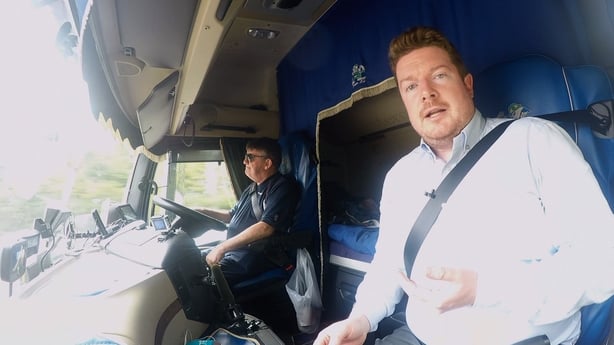"Should I set an alarm?" I ask. "No need, don't you worry! They’ll wake us up good and early!" is the reply.
My companion is truck driver Jack Corry and we’re about to spend the night together in very close proximity, in a cabin on the nine hour P&O sailing from Dublin to Liverpool to be precise. Most people would find it unusual to share a small room overnight with someone they’d just met, but this is standard practice for truckers, who will inevitably share with another driver on ferry crossings. Jack has been driving trucks for twenty years and his experience stands to us; our beds are narrow, but a quick word at the check-in desk has secured us each an extra pillow.
And Jack is not wrong about the wake-up call; at 04:30am sharp, a klaxon is sounded over the ship’s PA system and we’re told to rouse ourselves and get down to our truck sharpish. We’re on a mission to deliver a truckload of refrigerated pharmaceuticals to St. Nicholas in Belgium for Friday morning. It’s now Wednesday night. We’re also taking a route that 150,000 Irish trucks use every year – using Great Britain as a land bridge to get to continental Europe as quickly as possible.

It’s a crucial route not only for Irish exports but also imports, as the trucks tend to come back full after delivering their loads in Europe. For decades now, truckers are used to driving this route with minimum interruption; a quick check of papers before boarding ferries in Dublin and Dover, but nothing more rigorous than that as membership of both the EU Single Market and Customs Union ensures a frictionless journey from Ireland into the UK and across to the continent.
With the prospect of a hard Brexit looking ever more likely, there are obvious concerns about whether this system can endure a no-deal scenario. Will the UK insist on customs checks for Irish trucks coming into Holyhead or Liverpool? Will the French insist on checking trucks coming from the UK into Calais? What sort of delays will the checks cause? Could truck drivers be facing interminable waits to get onto ferries, or get off ferries on the other side?
We wanted to get a sense of how the system works now, so we enlisted the help of D.G. McArdle transport and Jack Corry, our driver. To get a full sense of the journey from Jack’s perspective, we needed to travel with him in the cab. Ordinarily, Prime Time reporters are fortunate enough to have a camera crew with them on shoots, but with limited space in the cab of the truck, it meant that I would have to film this myself. This involved setting up the cab with three Go-Pro cameras, another hand-held camera, a couple of microphones, and hoping that whatever I brought back was usable (if I managed to bring back anything at all). As we travelled from Dublin to Liverpool to Dover and then onto Calais, Jack was able to point out to me the places where he sees the problems arising.
It’s expected that the overwhelmingly majority of haulage companies will not be ready for the various checks that a hard Brexit could entail, but without knowing exactly what that will involve, it’s difficult for the companies to prepare accordingly. Dublin Port is making plans to manage traffic in the area, but it’s difficult to imagine that congestion in and around the port wouldn’t have an effect for traffic around the East Link bridge, the 3 Arena and the Dublin Port Tunnel. What begins as a problem for truck drivers could quickly become a problem for traffic across the city.
Of course, it may be the case that some arrangement is worked out, even in the event of no deal, that would aim to make this route as easy as possible for Irish truckers. After all, the UK wants to see disruption and delays at its ports about as much as Ireland does, but when we see projections of 100 mile tailbacks along the motorway into Dover, it may be difficult for any arrangements to clear a path through that sort of traffic.
It’s a system upon which Irish trade relies heavily, and it’s a system that works, but it’s a system that is very finely balanced. Delays to the delivery fresh fruit and vegetables, dairy, pharmaceuticals or other time-sensitive cargo could be disastrous, and if Irish exporters can’t guarantee that their produce will arrive on time and in the right condition, they may find themselves looking for new customers.
Jack and I part ways in Calais. He’s a long time in the trucking game, and he sees the effects of Brexit causing problems not just for Irish exports and haulage companies, but for the trucking profession. He sees fewer and fewer young faces at the truck stops and on the ferry crossings, and the faces he recognises are all getting older. He feels now that it’s no longer an attractive career, and that the prospect of spending hours on end in queues at ports and ferry terminals is unlikely to change that.






